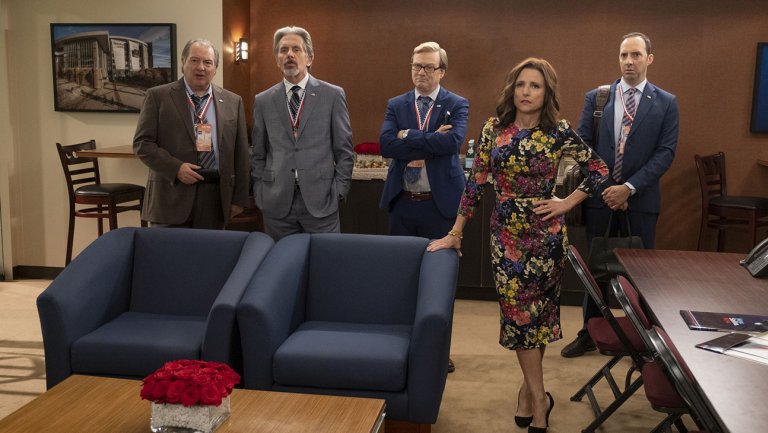
The reign of one of history’s most cunning and deplorable politicians came to an end on Sunday night as Selina Meyer and the Veep crew said goodbye after seven seasons, years spent pummeling the American political system and raising the bar for smart, filthy, and hilarious comedy. The morning after the finale aired, Uproxx spoke with Veep showrunner and series finale writer/director David Mandel about the fan response, lessons learned from working on Seinfeld at the end of its run, and deciding to introduce consequences and closure to the show’s final minutes.
How much attention are you paying today to critical reaction and fan reaction?
I’m not gonna lie, I look at everything. I do. I will say that I came to it a little slower today. I’m quite happy with it and I guess maybe on some level it made me a little more nervous to kind of check. [Laughs] When I did sort of finally check I got the sense that people like it. It would not have changed my opinion, though. I guess I would’ve been disappointed if it had not been well-received. I’m never going to change things for those reasons.
When you’re crafting the finale — and this has been a long time coming — how much is it trying to please the fans and how much is it that you’re trying to please yourselves?
Zero. I mean, I’m sorry. I’m not trying to dismiss the fans. I love the fans. But you know, if I was doing what the fans wanted, I mean I guess Dan and Amy would have been married in the final episode. I’m not quite sure. [Laughs] All I’ve ever really tried to do is make myself and a couple of my high school friends and college roommates laugh. I mean, that sounds crazy, but that’s who I’m writing for and it serves me well.
Seems like it’s working for you.
Julia [Louis-Dreyfus] is in there too. I wanted me to be happy and her to be happy and I just figured the chips will fall.
Can you talk a little bit about the challenge of dealing with the existence of the Trump administration over these last two seasons?
With season six, obviously, he was elected while we were shooting…And then, obviously, this year isn’t necessarily about the White House, it was about running for the White House. It was during the year of Julia’s cancer that we had broken the season and really kind of had some episodes written that, I will admit, we had to step back and kind of go, boy, politics are changing. I think the show needs to change to reflect this even though we’re living through it.
I didn’t want to do Trump jokes because they’ll get stale, but we did have to examine the sort of symptoms that led to Trump and the things that Trump is, I guess, sort of causing. So sort of trying to do everything about Trump except Trump, because it’s not just Trump, it’s this kind of leadership all across the globe. Why, all of a sudden, in the 21st century, are authoritarian governments and authoritarian leaders rising up to be stronger than they’ve been in years? What’s going on? And trying to sort of reflect all of that. And so, it was a huge challenge. But if you look back… If you go back to whatever, you know, season two or three, so many of those episodes almost have been invalidated by Trump. I don’t want to say invalidated, but there’s really no other word. Do you know what I mean? You look back and just go, if that was now, the show would just seem like it was taking place in some sort of weird, simpler alternate universe. Whether you like Trump or not (I don’t care for him) you cannot not admit that he has changed politics. I’m not arguing good or bad. It’s changed, though. And because it’s changed, we’ve had to change.
Was there ever a point when you had Jonah taking the presidency?
No, never. I guess, as cynical a bastard as I am, I never could fully push him into the Oval. I guess it’s interesting, I know there are a lot of people out there going, oh, “Selina should be veep.” Not so much about the final episode, but in the leadup to the final episode where they thought the end was going to be Selina as veep. And in a weird way, she’s done that. We know what that is. But also, she could deal with that. But the more, sort of perfect sort of torture for her was to get it [the Presidency] but to suffer from having gotten it. But for Jonah, a man of his kind of power hungriness? I think the vice presidency was the perfect punishment for him, in a way. [Laughs]

That moment at the end with her alone and feeling regret and loneliness, was that always a part of the plan? Because it’s very powerful.
Yeah. I mean, look, I’m certainly the first to say it’s very easy for me to go “she sits there, she regrets what she’s done, blah, blah, blah, blah, blah.” Obviously, it’s not until we get Julia in front of the lens that it becomes what it is. The little line in my script ain’t quite as powerful as what Julia brings to it. I get to have her as a tool in my bag, but yeah, it was the notion of she gets everything she always wanted and it tortures her for the rest of her life, to some extent. I like them to think, personally, that any moment she’s alone, especially like upstairs at night in the residence or whatever… It’s just strangers in there. That if the Presidency isn’t occupying her, she is tortured by her own feelings.
Is that something you imagine Trump has?
I don’t know about now because the man is very delusional, but I did have the sense early on that he was sitting up in the residence at night going, “What the fuck?” Maybe not, maybe not the same level of regret, but maybe, “How did I get here?”
Did that have anything to do with you wanting to have that same thing for Selena, or was it just you needed to have some kind of consequences for all of her actions?
It was about the consequences. I mean, for me, it was really about that this is a horrific person who has always wanted the presidency. And if you look how we kicked it off at the end of season six with her throwing away the relationship with Jafar — what else is she prepared to do? And she’s prepared to do a lot more. And what is the cost of this action? And so it’s really very much about the character. Let’s just take Trump out of the equation. Selina has been this way since the beginning. This is not new to her.
Yes.
I think we shined a light on it, but this is her. And so, I shake my fist occasionally when everybody is so quick to go, “Oh, the show has changed so much because of Trump.” And it’s sort of like, no, she was this horrible, narcissistic, short-tempered person who didn’t really want to be president, but loved the trappings of the presidency seven years before Trump. And I guess that’s something that sticks in my teeth.
Curious, did you pay attention to the reactions or the actual execution of other finales? Even things that you’ve been involved with like Seinfeld. I think it’s a coincidence, but it’s interesting to me that the Seinfeld finale has characters who did sort of terrible things and then they faced consequences at the end. And that’s similar with Selina, though done very differently.
Yeah, like obviously, I was there for that. I was there with Larry and Jerry and that was sort of a big influence on me. Not necessarily specifically thinking, “Well they did consequences we should do consequences.”
Yeah, no. Of course not.
But just in terms of having an opportunity to use your finale to shed a larger light on the whole run of the show and the characters. Look, while I’m a fan of it, obviously it has its detractors. And so be it. I think that’s what I learned from Larry David, which is not to fucking care. You know what I mean? He made the show he wanted and that’s all I tried to do here. I’m a TV fan though, for wherever that fits in. And so there are great finales that I truly loved like St. Elsewhere and Newhart. Things like that. They were on my mind in the sense that I definitely thought about them all a little bit. Not so much that I broke them down and analyzed them, but they’re a part of me as a TV fan, you know what I mean? I can’t say to you, oh, this led to this, but they’re in my makeup.
With finales, that flash reaction is so tied to the emotional end of a relationship with the viewer. I feel like that’s what we’re seeing with Game Of Thrones where so many people are up in arms. And I feel like in a few years, if they revisit it, maybe it might be more appreciated. I did not like the Seinfeld finale at first. But over the last couple of years, I’ve revisited it a couple of times and I have started to like it more. Same thing with The Sopranos. Like, I started to understand the reasoning behind the decisions as opposed to just what I was seeing on the screen.
With Seinfeld, and I know it wasn’t the finale, but I’ve never forgotten how horrified people were when Susan died, and yet now it’s looked back upon — I don’t want to say it’s watershed, but just, you know, it’s truly one of the defining moments of the show. And so I always try and remember that. But again, it’s been very enjoyable to see people that seem to be digging it today and I hope that, 20 years from now, they’re still digging it. And if they don’t, fuck them.
Was there ever a thought to end it on Selina winning instead of taking it to the future and kind of Six Feet Under-ing it?
What I’ll say about the end part is, I think because we’re talking about the presidency… so much of the presidency is what people think of you when you’re in office and then the larger question is how does history judge you? That’s a really big part of the presidency. And to really get a sense of how history would judge Selina, I felt you needed to go to the future. Sure, by doing that we would get all this wonderful character stuff and see how everybody wrapped up, but the larger point is to sort of see the final indignity, which was her funeral. A president who didn’t particularly accomplish much, and then she is bumped out of her own news cycle by a better death (Tom Hanks).
That, to me, is the final word on Selina. And, in some ways, it’s her punishment. It’s the vice presidency, but in a different form.






